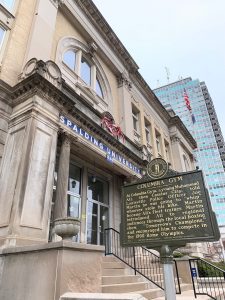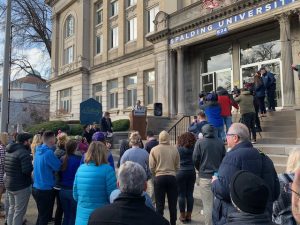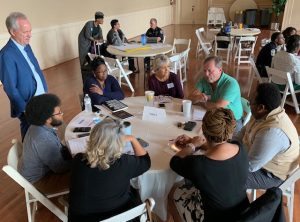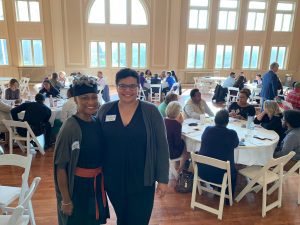A new historical marker was unveiled on Thursday morning at Spalding University’s Columbia Gym that commemorates the building at 824 S. Fourth St. as the location where a young Muhammad Ali learned to box.
The marker unveiling took place one day before what would have been Ali’s 78th birthday on Jan. 17. On Ali’s birthday two years ago, Spalding officially changed the name of its athletic building back to Columbia Gym.
A red bicycle hangs over the entrance of Columbia Gym as a tribute to Ali and his first encounter with Louisville Police Officer Joe Martin, who ran a boxing gym in the lower level of the building and became Ali’s first trainer.

The Columbia Gym historical marker, which is located next to the front steps of the main entrance, is one in a new series of Ali-related markers around the city that are produced by the Kentucky Historical Society and that celebrate the legendary humanitarian and boxer’s Louisville roots. The series of markers is supported by Louisville Tourism, which also developed the Footsteps of Greatness tour of Ali-related landmarks in Louisville that includes Columbia Gym.
On Thursday, Ali’s brother, Rahman Ali, joined Spalding President Tori Murden McClure in pulling off the cloth cover to reveal the Columbia historical marker.
“That sense of striving, that sense of passion, that sense of wanting to make the world a better place is what (Muhammad Ali) stood for,” McClure said.
In what has become a key piece of Louisville history, in 1954, 12-year-old Muhammad Ali, then known as Cassius Clay, parked his new red bicycle outside the building at 824 S. Fourth St. while he went inside to attend the Louisville Home Show. When he came back out, the bike had been stolen. An angry Clay found Martin there and reported the crime, telling Martin that he planned to “whup” whoever took the bike.
Martin told Clay that before he could do that, he better first learn to fight. He then introduced Clay to training at the Columbia Gym, setting in motion what would become a storied amateur boxing career that included winning a gold medal at the 1960 Rome Olympics.

Spalding acquired the building years later, and Columbia Gym is now the home of Spalding’s NCAA Division III volleyball and men’s and women’s basketball teams, as well as the Golden Eagles’ athletic department offices and the historic Columbia Auditorium, where many campus and community events are held. Spalding’s student fitness center, weight room, athletic training room, locker rooms and health clinic are located on the lower level, where Joe Martin’s boxing gym once was.
A series of photo panels on the wall of the lower level pay tribute to the red bike story and Ali’s ties to Spalding. As a teenager, Ali had a part-time job across the street from the Columbia Gym at what was then the Spalding library.
Muhammad Ali Center President and CEO Donald E. Lassere, Louisville Tourism Vice President of Destination Services Zack Davis, Kentucky Historical Society Community Engagement Coordinator Ali Robic, Spalding Dean of Graduate Education Dr. Kurt Jefferson and Spalding Athletics Head Strength and Conditioning Coach Danielle Lavender also spoke at Thursday morning’s dedication.
Lavender, who trains Spalding’s student-athletes in the Columbia Gym, said they draw inspiration from training in the same general space where Ali began his journey to athletic greatness.
“It’s awesome working in this building every day,” Lavender said. “It’s me with 150 athletes, and every day they are trying to come in and do better. Over our doors, (inspirational messages) say, ‘Effort is everything,’ and they know that. With this historical marker now and everything we have up in the hallways (alluding to Ali), they know, ‘You better give it your all down here.'”
About the Kentucky Historical Marker Program: The Kentucky Historical Marker Program, administered by the Kentucky Historical Society in cooperation with the Kentucky Transportation Cabinet, tells Kentucky’s story through on-the-spot history lessons that connect the history, communities and items housed in the Commonwealth’s many historical organizations. The program makes Kentucky’s history accessible to the public not just on markers along the state’s roadways, but also online at www.history.ky.gov/markers and via the Explore Kentucky History smartphone application available free at iTunes and Google Play.

